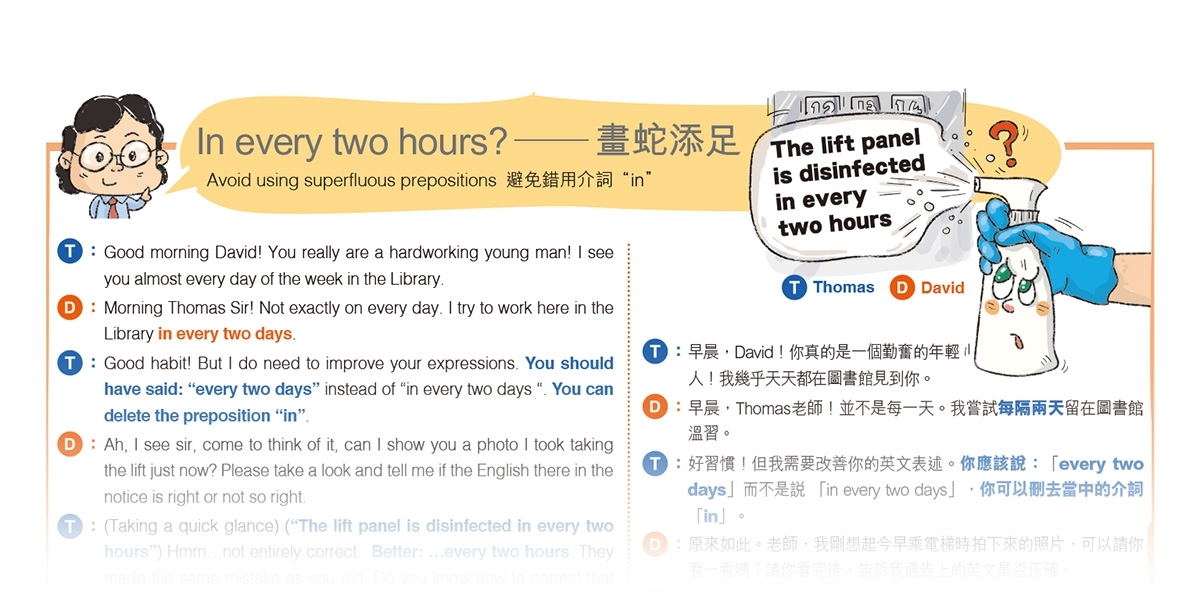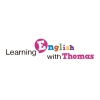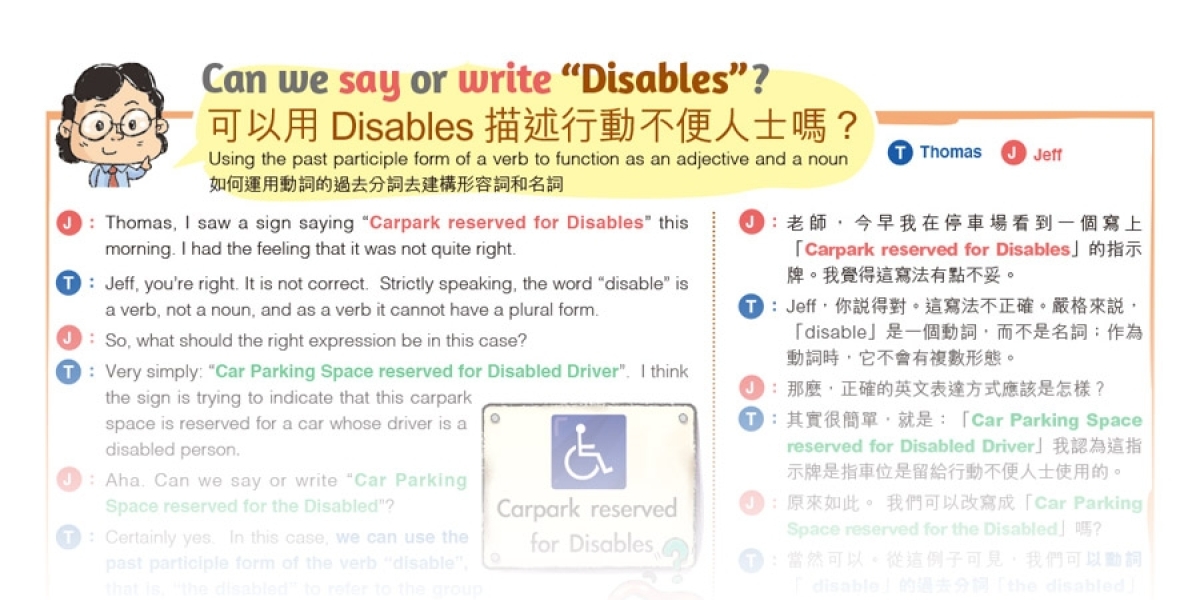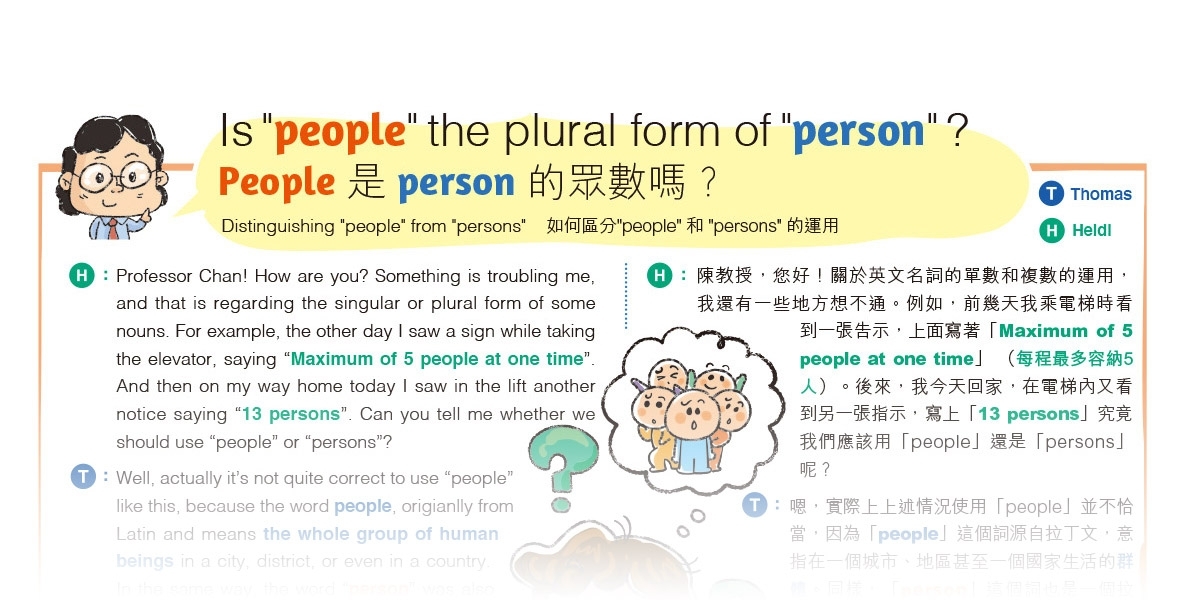昔日文章


Learning English with Thomas
2022.12.04
In every two hours? —— 畫蛇添足
Avoid using superfluous prepositions 避免錯用介詞“in”
T : Thomas D : David
T : Good morning David! You really are a hardworking young man! I see you almost every day of the week in the Library.
D : Morning Thomas Sir! Not exactly on every day. I try to work here in the Library in every two days.
T : Good habit! But I do need to improve your expressions. You should have said: “every two days” instead of “in every two days “. You can delete the preposition “in”.
D : Ah, I see sir, come to think of it, can I show you a photo I took taking the lift just now? Please take a look and tell me if the English there in the notice is right or not so right.
T : (Taking a quick glance) (“The lift panel is disinfected in every two hours”) Hmm…not entirely correct. Better: …every two hours. They made the same mistake as you did. Do you know how to correct that now?
D : Now I can, sir. It should be: “The lift panel is disinfected every two hours.” Is that right?
T : Haha! You certainly got it – learning fast and applying at once. (Teacher raising his thumb smilingly)
T : 早晨,David!你真的是一勤奮的年輕人!我幾乎天天都在圖書館見到你。
D : 早晨,Thomas老師!並不是每一天。我嘗試每隔兩天留在圖書館溫習。
T : 好習慣!但我需要改善你的英文表述。你應該說:「every two days」而不是說 「in every two days」,你可以刪去當中的介詞 「in」。
D : 原來如此。老師,我剛想起今早乘電梯時拍下來的照片,可以請你看一看嗎?請你看完後,告訴我通告上的英文是否正確。
T : (瞥了一眼)(「The lift panel is disinfected in every two hours」)嗯……這樣寫不完全正確,寫成「every two hours」較佳。 他們跟你一樣犯了相同的錯誤。你現在懂得如何修改嗎﹖
D : 老師,現在我懂了。這應該改為:「The lift panel is disinfected every two hours」,對嗎?
T : 哈哈,你果然是學以致用。(老師欣慰地豎起大姆指)


Learning English with Thomas
2022.10.30
Can we say or write “Disables” ?
可以用Disables 描述行動不便人士嗎?
T: Thomas J=Jeff
Using the past participle form of a verb to function as an adjective and a noun
J: Thomas, I saw a sign saying “Carpark reserved for Disables” this morning. I had the feeling that it was not quite right.
T: Jeff, you’re right. It is not correct. Strictly speaking, the word “disable” is a verb, not a noun, and as a verb it cannot have a plural form.
J: So, what should the right expression be in this case?
T: Very simply: “Car Parking Space reserved for Disabled Driver”. I think the sign is trying to indicate that this carpark space is reserved for a car whose driver is a disabled person.
J: Aha. Can we say or write “Car Parking Space reserved for the Disabled”?
T: Certainly yes. In this case, we can use the past participle form of the verb “disable”, that is, “the disabled” to refer to the group of people under description, like “the rich”, “the poor”, “the privileged”, etc. See?
J: Loud and clear, Sir. And thank you, Sir.
如何運用動詞的過去分詞去建構形容詞和名詞
J: 老師, 今早我在停車場看到一個寫上「Carpark reserved for Disables」的指示牌。我覺得這寫法有點不妥。
T: Jeff,你說得對。這寫法不正確。嚴格來說, 「disable」是一個動詞,而不是名詞;作為動詞時,它不會有複數形態。
J: 那麼,正確的英文表達方式應該是怎樣?
T: 其實很簡單,就是:「Car Parking Space reserved for Disabled Driver」我認為這指示牌是指車位是留給行動不便人士使用的。
J: 原來如此。 我們可以改寫成「Car Parking Space reserved for the Disabled」嗎?
T: 當然可以。從這例子可見,我們可以動詞「 disable」的過去分詞「the disabled」來描述一個群體, 例如: 「t h e r i c h 」(富人) ,「the poor」(窮人), 「the privileged」(特權人士) 等等,明白嗎?
J: 你的解釋很清楚。謝謝老師。


Learning English with Thomas
2022.09.30
Is "people" the plural form of "person" ?
People 是person 的眾數嗎?
T : Thomas H : Heidi
H : Professor Chan! How are you? Something is troubling me, and that is regarding the singular or plural form of some nouns. For example, the other day I saw a sign while taking the elevator, saying “Maximum of 5 people at one time”. And then on my way home today I saw in the lift another notice saying “13 persons”. Can you tell me whether we should use “people” or “persons”?
T : Well, actually it’s not quite correct to use “people” like this, because the word people, origianlly from Latin and means the whole group of human beings in a city, district, or even in a country. In the same way, the word “person” was also a Latin word and referred to any individual human being. So, the use of “persons” should be used in your example, as we can count one, two, three, four … individuals.
H : I see, thank you Professor!
H : 陳教授,您好!關於英文名詞的單數和複數的運用, 我還有一些地方想不通。例如,前幾天我乘電梯時看到一張告示,上面寫著「Maximum of 5 people at one time」 (每程最多容納5 人)。後來,我今天回家,在電梯內又看到另一張指示,寫上「13 persons」究竟我們應該用「people」還是「persons」呢?
T : 嗯,實際上上述情況使用「people」並不恰當,因為「people」這個詞源自拉丁文,意指在一個城市、地區甚至一個國家生活的群體。同樣,「person」這個詞也是一個拉丁詞,解作一個人。所以,在第一個例子中應該使用「persons」,因為我們可以數算到多少人,即一、二、三、四 ⋯⋯個人。
H : 我明白了,謝謝教授!


中學專題
2022.06.26
張振興伉儷書院 Try.程.尋
尋找目標 發掘潛能
(本報專題)在學期快將結束前, 在學習以外,你們有沒有為自己定下目標,努力向前,讓自己的人生有所成長? 天主教喇沙會張振興伉儷書院本學年為學生設下「Try.程.尋——正向自主啟航計劃」,校長黃世堯深信每位學生也有潛能,學生只要在個人目標上,每天訂下一小步,定會有所成長,最終達成目標。
「你願意如同聖母瑪利亞,成為那顆海洋之星,為別人發光發亮嗎?」發起「Try.程.尋」計劃的副校長何泰安說:「聖母瑪利亞在教會歷史中被喻為海洋之星(Stella Maris),她為我們提供明確的方向,在生活中妥善活出每人自身的品格強項。」他以航海比喻人生,當學生訂下明確目標和方向,即使在實現目標過程中遇到困難,憑著毅力克服,並信靠天主學會交託,「只要朝著你人生中的那顆星,自然發揮個人才能;團隊之間的彼此鼓勵,給予正向能量。」
「Try.程.尋」計劃
「Try.程.尋——正向自主啟航計劃」是一項為全校學生制定自學目標的計劃。社工呂任杰指出,學生在計劃下與班主任一起訂定個人目標,認識自己的品格強項,再從中邁向及完成目標。正如是次計劃小冊子的首頁寫著「啟航」的比喻: 「人生好比航海,要有明確目標和方向才可成為正直不阿的人,將來為社會服務。你們每一位都是掌舵人,應嘗試發揮自己的塔冷通,在旅途中駕駛自己的帆船,尋找你人生的那顆星星。」這項計劃包括:
Try:自主學習,當遇到困難時懷著信德,憑著天主的幫助,不要放棄,繼續完成目標;
程:讓學生確立目標;
尋:善用自己的塔冷通,發展品格強項。
在發展品格強項中,該校引用心理學家沙利文(Martin Seligman)和彼得森(Christopher Peterson)的品格強項, 識別出六種美德:智慧、勇氣、仁慈、靈性、公義和修養,以及24種性格強項, 學生藉著尋找個人的性格特質並加以發揮,推動正向教育。
熱愛足球 自學英語
兩位中四學生林倬康及陳錦鋒熱愛足球,二人均是曼聯及曼城球迷,他們不時瀏覽海外足球網站以盡快取得第一手消息,這次他倆在Instagram設立賬號「mcfans.hk」,定時上載曼城和曼聯的新聞消息,向外分享足球的樂趣。
林倬康目標是提升英語能力,於是他選擇翻譯足球資料,藉此認識英文詞彙, 「透過閱覽海外足球的網上資訊時,為確保發放正確的足球資訊,搜集資料時經常查閱字典,從中學習足球的英語用語,過程中提升我在學習英語的興趣。」負責版面設計的陳錦鋒則以圖像或影像等吸引讀者收看。
在「Try・程・尋」計劃下,中四學生徐健浩希望學習做DJ(唱片騎師),於是他跟專業的DJ老師學習打碟及混音等技巧,也嘗試給廣東歌填詞,學習過程中他明白詞彙表達的重要,期望從創作中提升中文寫作的技巧。
修讀視覺藝術科的中四學生林文浩趁著早前的特別假期,畫下一幅有關靈魂的作品,在天平上分別放上蝴蝶及羽毛,蝴蝶比喻靈魂,透過羽毛衡量人的善與惡,他認為透過繪畫豐富他的創作靈感,為未來從事設計行業作好準備。
編寫射擊遊戲 寓學習於娛樂
中三學生林靖希喜歡打遊戲機, 於是與老師商討設計平面射擊遊戲, 老師建議他先選擇遊戲引擎開發遊戲,開發遊戲過程中,他在YouTube 自學取經,試過出現程式錯誤,需要花上數小時尋找問題,他在過程中學會主動求學,提升自信心。
中四學生王啟政、楊及楊學文均表示以提升學業成績為目標,王啟政將目標定為於本學年考取全級第一,他表示每天設下溫習時間表,加強溫習弱項科目;楊認為自己的英文能力弱,於是在3月的特別假期中,多看英語電影及英文書籍,他說輕鬆學習培養他主動學習英語。楊學文則在溫習時主動把手機交給家人看管,「因我訂下目標,令我更希望能專注溫習。」
另外,這計劃亦邀請中一至中三學生於美術課堂中設計24個品格強項的徽章,中二學生張訢宇及戴卓毅有份參與以「智慧」為題的標誌,他倆指出,藉著作品帶出青年的創意及好奇心,從而發掘個人強項致力追求知識。
本學年是張振興伉儷書院創校50周年,校長黃世堯指出,本學年其中的關注事項為自主學習,藉著上述計劃幫助學生確立目標,培養學生的全人發展。他指出,疫情持續已逾兩年半,直接影響學生的學習與成長,「『Try・程・尋』計劃有助學生懷著堅毅實現目標,有助提升學生的自信心。」
教師鄭崢嶸表示,學生與老師傾談學習目標時,藉著彼此交流了解學生需要,他相信當學生找到個人的品格強項並加以發揮,有助投入校園生活。另一教師梁耀霖感受到,學生在追尋目標時, 建立堅毅與自信。(高)


